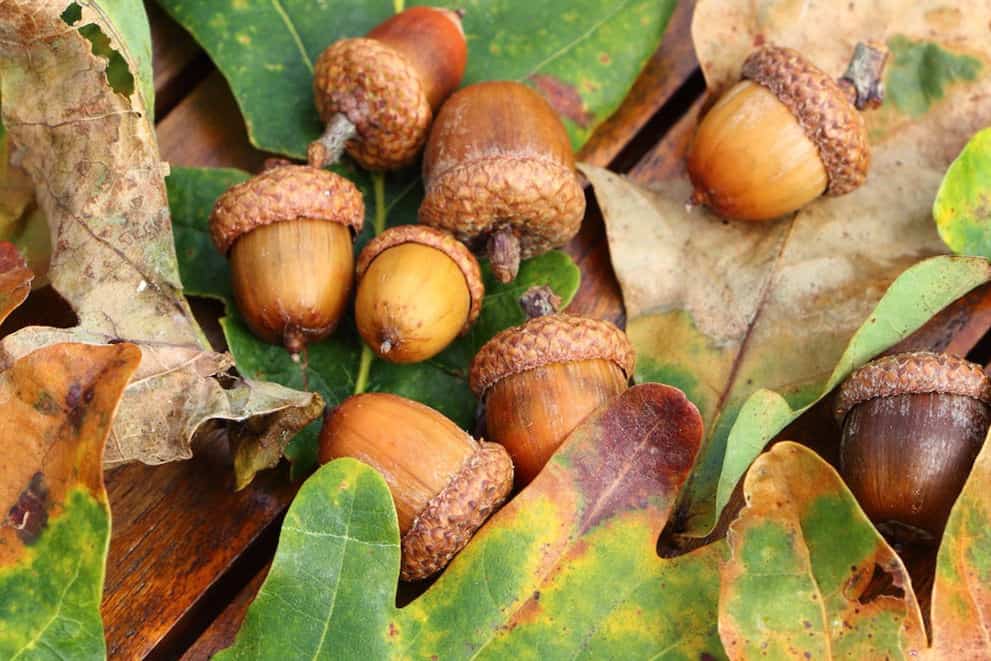Oak trees are found across the world. Along with many oak trees are a large number of acorns. As chickens are natural foragers, eating an acorn or two is not unusual. With all of that said, can chickens eat acorns?
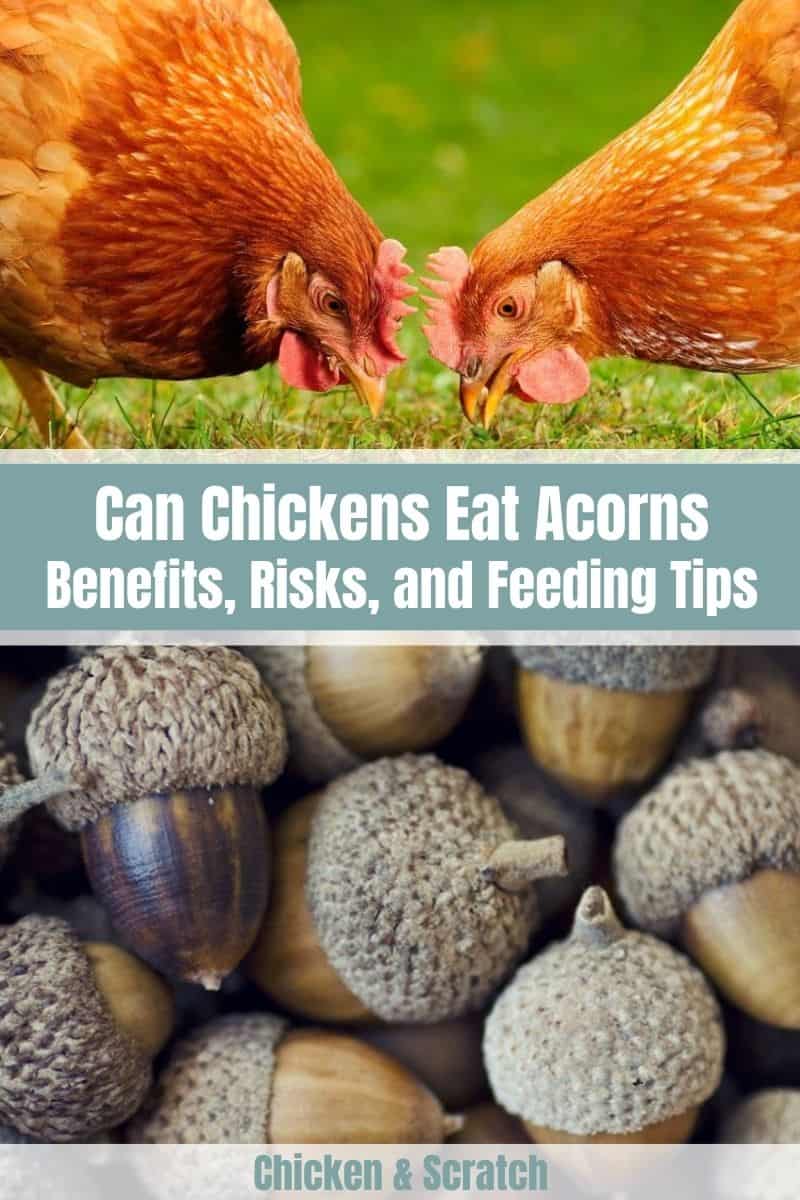
Can Chickens Eat acorns?
As natural foragers, chickens will eat most plants and insects from their environment. It can be an excellent feature as they are not picky eaters, but it can also be harmful. One of the instances is chickens eating something that can be dangerous to their health.
Since oak trees and acorns are widely available, the acorn nut has been a concern for many. Aside for squirrels and some birds, eating acorns can pose health problems to many animals.
There is much polarizing information regarding if chickens can eat acorns. It’s concluded by many that chickens cannot eat regular acorns. With that said, with proper preparation, you can safely give acorns to chickens.
For example, leaching can safely remove tannic acid from the acorn. However, most methods need a lot of time and effort to do. Some farmers cannot equate the benefits with the amount of work.
Feeds and common vegetables are good enough for chickens. Acorns are not recommended to be a part of the chicken’s diet.
Unlike other backyard plants, acorns can pose a risk to your chickens. This does not mean that a chicken eating a piece of acorn will die. It means that farmers and breeders need extra care when dealing with the plant.
Benefits of Acorns to Chickens
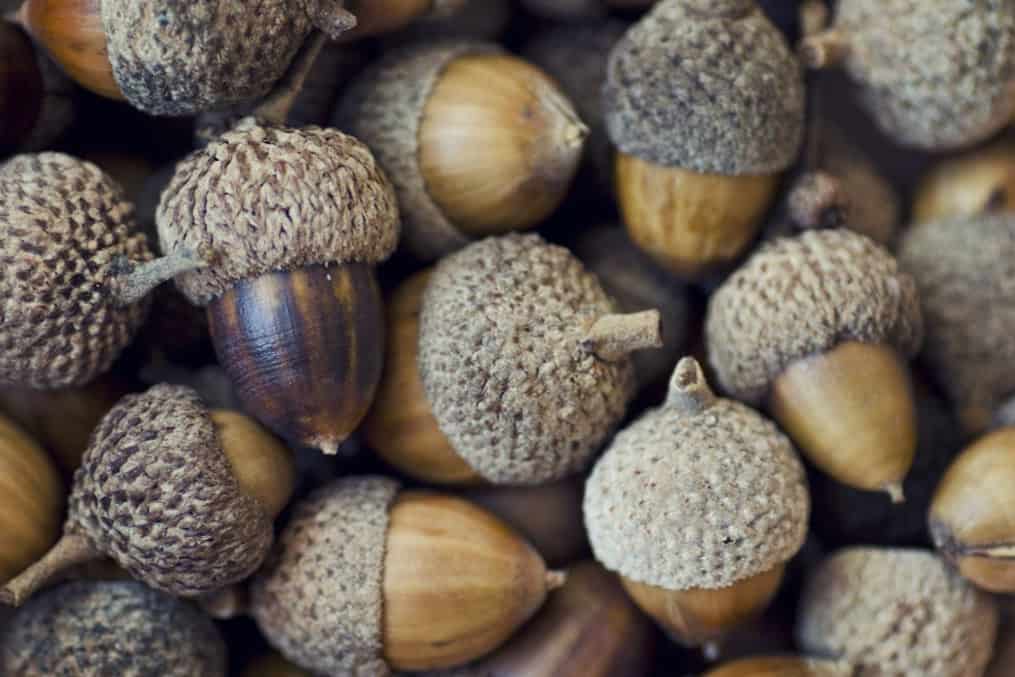
- Calories: 387
- Total Fat: 24g
- Carbohydrate: 41g
- Protein: 6.2g
- Calcium: 41mg
- Iron: 0.8mg
- Potassium: 539mg
- Vitamin B9: 87mcg
When it comes to the benefits of acorns to chicken, their calcium and protein content is the most significant benefit. It also has small amounts of vitamin B9, iron, and potassium. Other than that, there are not many benefits from acorns.
Acorns are a good source of needed nutrition for squirrels, but not much with chickens. Since chickens are omnivores, they will need much more nutrients to survive.
One of the most common uses for acorns is as treats and supplements for hens. You can feed a piece or two of acorn a week to a mother hen.
How are Acorns Dangerous to Chickens?
Acorns are harmful to chickens because of their tannins or tannic acid. Large consumption of the chemical can lead to kidney failure and Quercus poisoning. Acorns can also affect the gut health and intestinal process of the chicken.
Of course, not all oak trees have the same amount of tannic acid. Acorn from white and pink oak trees contains much lower tannic acid levels. So, many birds like chickens also indulge in their acorns.
Acorns also have a very high number of calories. It can make your chicken obese at a large consumption, leading to fewer eggs. It also makes their meat a lot fattier and less quality.
What are the Types of Acorns Best for Chickens?
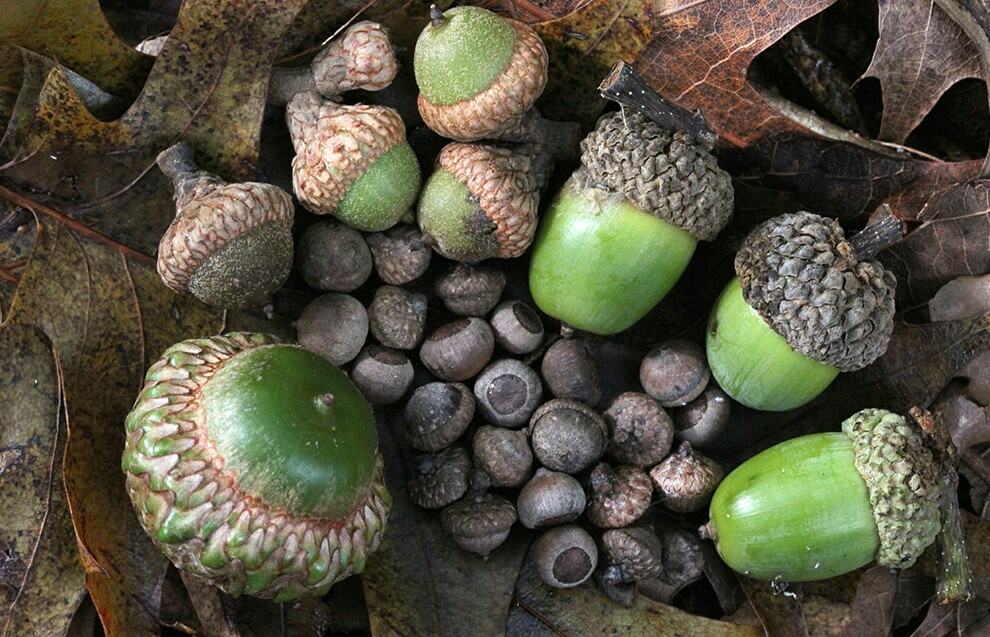
| Type of Oak Tree | Tannic Level |
| White Oak | Very Low |
| Pin Oak | Low to medium |
| Red Oak | Medium |
| Black Oak | Medium to High |
| Bur Oak | Medium to high |
| Live Oak | High |
A white oak tree is the safest acorn source for your chickens. Some chickens and other birds in the wild even munch on its acorns.
It’s relatively safe, even with large consumption. However, if acorns from white oaks are ingested regularly, some damage can happen.
On the other hand, acorns from red oak should be avoided entirely. Red oak is one of the most common types of oak trees worldwide. Unfortunately, the acorn from the tree contains large numbers of tannic acid.
Dangerous Effects of Acorn on Chickens
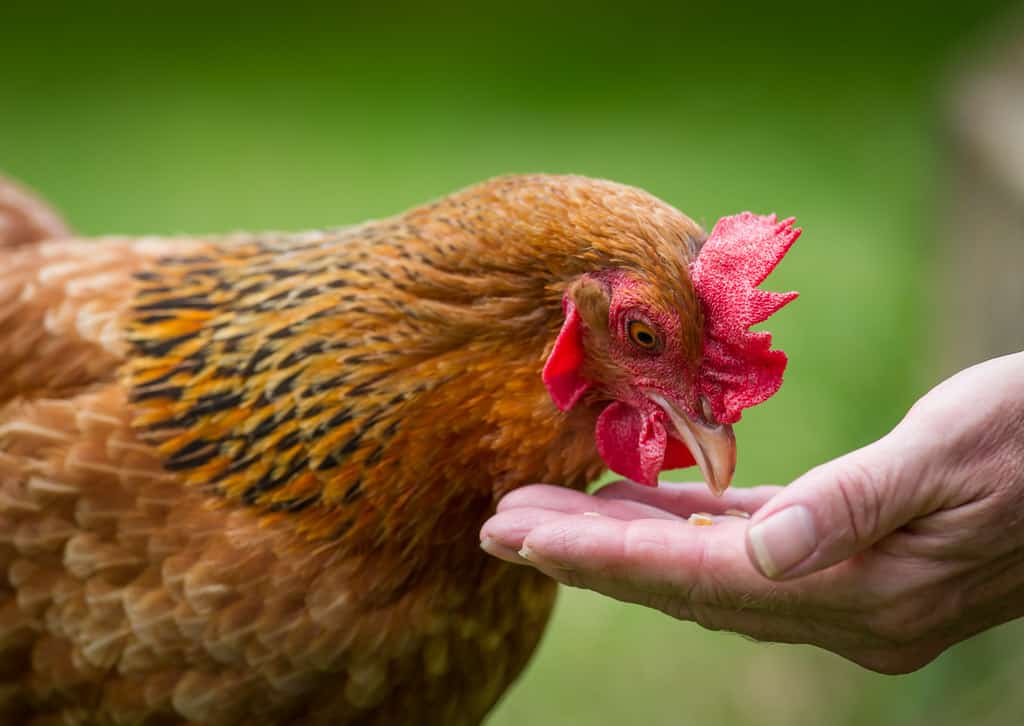
Quercus Poisoning
Quercus poisoning is also called oak poisoning and acorn poisoning. It’s a poison common to cattle and other farm animals. Quercus poison comes from the tannins present in oak trees, leaves, and nuts.
It can cause significant organ damage if not treated correctly. Some common symptoms of Quercus poisoning are:
- Loss of Appetite
- Lethargy
- Diarrhea
As you can see, its symptoms are common with food poisoning. Bring them to the vet immediately if your chickens show these symptoms and suspect they ingested acorns. Prolonged exposure to tannic acid can cause their organ systems to collapse.
Rectal Damage
Once the chicken ingests the tannic acid, the digestive tract is at risk of damage. One of the common symptoms is diarrhea. If diarrhea continuously disrupts the chicken’s bowel system, the rectal tissue can be severely damaged.
This can lead to the chickens developing renal abscesses and tissue scarring. Diarrhea can also cause the chicken to be severely dehydrated.
Organ Damage
One of the most fatal and dangerous effects of tannic acid is organ damage. The digestive tract is one of the first systems to be targeted. The chicken will show signs of disruption akin to food poisoning.
However, if tannic acid is regularly present in the systems, the kidney and liver can also be at risk. The kidney can be swollen and result in kidney failure. This can be fatal as the chicken does not have any filter system in its body.
The life is also at risk of liver failure. This can be fatal for the chicken if not treated immediately.
Are Oak Leaves Safe for Chickens?
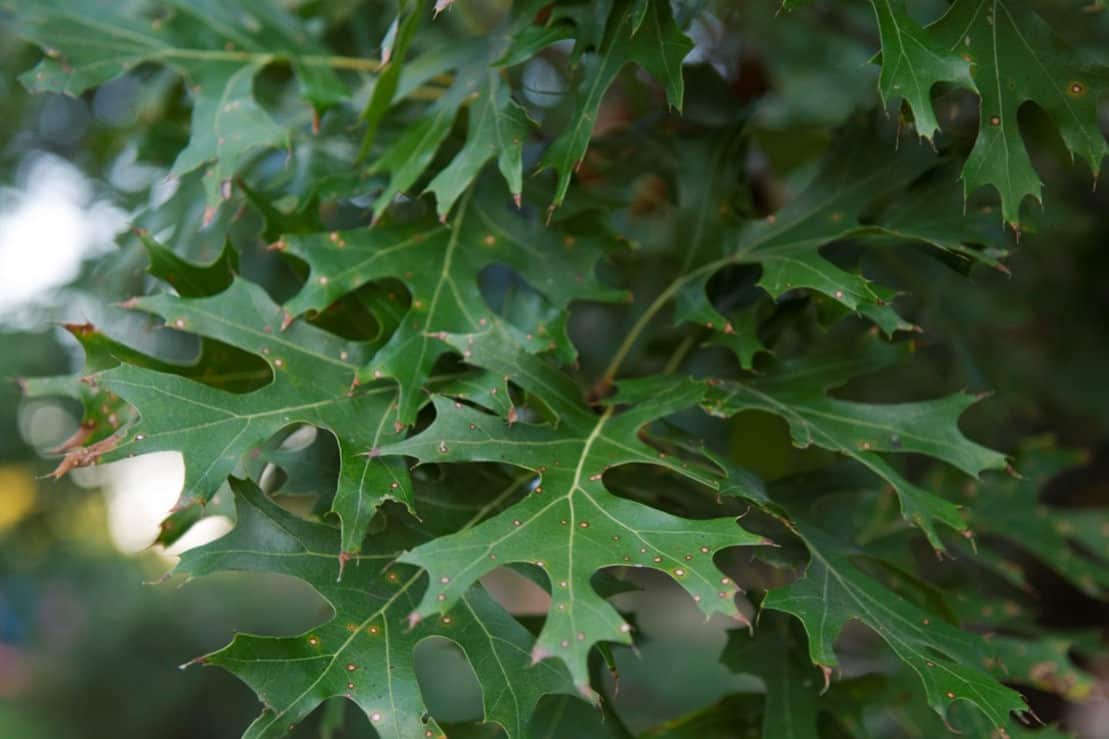
Oak leaves are not safe for chickens. Like the fruit of the oak tree, its leaves also contain tannic acid. Famers should be wary of the leaves falling from the oak trees. If oak leaves are ingested in a large amount, the chicken might suffer various intestinal problems.
If there is a nearby oak tree where your chicken pen is, keep the leaves away. Chickens are naturally curious animals. It would probably try to nibble on an oak leaf or two.
It’s best to provide the chickens with the protection it needs. Make sure that they have the least amount of exposure to the acorn.
How to Safely Give Acorns to Chickens?
Although acorns have dangerous chemicals, you can take some steps to make them safe. By cleaning and boiling the acorns, you can remove the tannic acid. It also makes the nut easier to chew for chickens.
One of the most common methods of removing tannic acid is leaching. To properly leach the acorns, you need to:
- Remove the shell and caps of the acorn. The only remaining part should be the nut inside.
- Boil water in two separate parts. Make sure that the water is boiling hot before you put the acorns.
- Once the water is boiling, pour the acorns inside.
- Let the acorn boil for ten to fifteen minutes. You will notice the water gets dark; those are the chemicals being drained out along with the tannic acid.
- Once the acorns finish boiling, strain them.
- Then, boil it again in clean water. Repeat this process until the water boiling the acorns is clear.
This process can be labor and cost expensive. It needs high power for the fuel and supplies of water. However, it makes the acorns safe to eat for the chickens.
If this process is tedious for you, you can try the cold-water method. To do the cold-water form, you need to:
- Pour the acorns into a container full of cold water.
- Let the acorns soak and leach off the tannic acid.
- Once the water turns dark, change the water. Continuously soak the acorns and change the water until it turns transparent.
The cold-water process needs fewer labor resources to do. However, it can take days for the water to be completely clear. The method is also less effective than the boiling method.
Once you take these steps and methods, the acorns are entirely safe for your chickens to eat. However, it’s not recommended to be a regular chicken food source. Despite being safe, leached acorns do not offer many nutrients.
How Many Acorns Can Chickens Have?
Raw and unripe acorns should not be fed to a chicken at all. If there is an oak tree in your yard, make sure that a net keeps the acorns and leaves from falling to the ground. The leaves and acorns can cause stomach and digestive problems.
However, leaching the acorns can lower the risks of poisoning. With leached acorns, a piece or two is enough for a week. You can give it as a treat or supplement to the chickens.
With that said, acorns should not be a part of the chicken’s diet. It can cause significant health problems such as liver damage and kidney failure in the long run. You can opt for other nuts such as almonds and pecans.
In Summary
Acorns are not recommended to be a food source for chickens. Its high tannic acid can cause many health risks for the chicken. However, leaching can help remove the toxic chemicals in acorns. With that said, it’s still high in cholesterol and pretty low in nutrients.
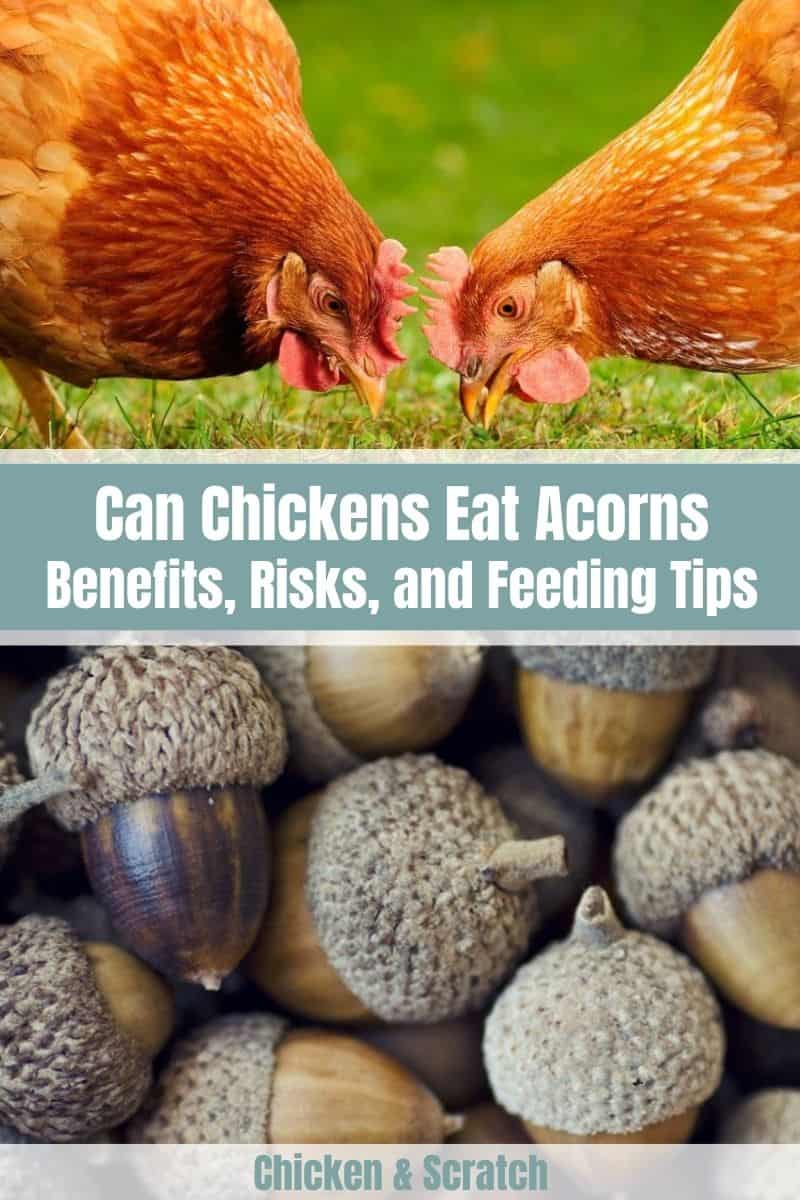

Joseph Hudson has been raising chickens for over 15 years. In 2018, he completed the Agriculture & Natural Resources program at Mt. San Antonio College. He currently raises over 1400 chickens on his 7.5-hectare farm. He keeps sharing his experience on raising healthy and happy chickens on Chicken Scratch The Foundry.
